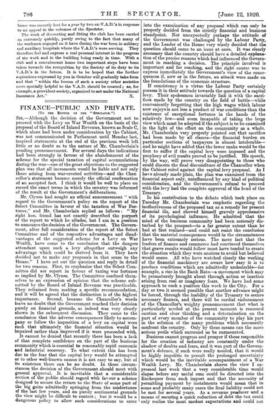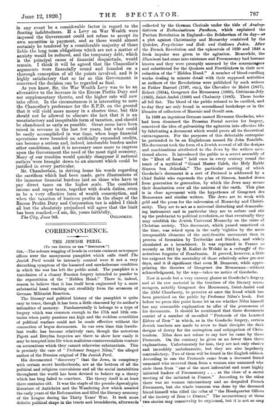FINANCE—PUBLIC AND PRIVATE.
(To THE EDITOR OY THE " SPECILT01."]
SIR,—Although the decision of the Government not to proceed with the Levy on War Wealth on the basis of the proposal of the Board of Inland Revenue, known as Scale C, which alone had been under consideration by the Cabinet, was not communicated to Parliament until Monday last, inspired statements at the end of the previous week 'left little or no doubt as to the nature of Mr. Chamberlain's pending pronouncement. For several days the indications had been strongly in favour of the abandonment of the scheme for the special taxation of capital accumulations during the war--one of the great objections to the suggested plan was that all increments would be liable and not only those arising from war-created activities—and the Chan cellor's statement became merely the official confirmation of an accepted fact. I think it would be well to place on record the exact terms in which the country was informed of the result of the Government's deliberations.
Mr. Clynes had sought an official announcement " with regard to the Government's policy on the report of the Select Committee in favour of the taxation of War For- tunes," and Mr. Chamberlain replied as follows : My right hon. friend has not exactly described the purport of the report to which he alludes, but I am in a position to announce the decision of the Government. The Govern- ment, after full consideration of the report of the Select Committee and of the respective advantages and disad- vantages of the suggested scheme for a Levy on War Wealth, have come to the conclusion that the dangers attendant upon such a levy altogether outweigh any advantage which could be derived from it. They have decided not to make any proposals in that sense to the House." I have set out the question and reply in detail for two reasons. First, to emphasize that the Select Com- mittee did not report in favour of taxing war fortunes as implied by Mr. Clynes. The Committee confined them- selves to an expression of opinion that the scheme sub- mitted by the Board of Inland Revenue was practicable. They refrained from making a specific recommendation, and it will be agreed that the distinction is of the highest importance. Second, because the Chancellor's words leave no doubt that the Government reached their decision purely on financial grounds, as indeed was very clearly shown in the subsequent discussion. They came to the conclusion that the adverse consequences likely to accom- pany or follow the imposition of a levy on capital were such that ultimately the financial situation would be impaired rather than improved if it were proceeded with.
It cannot be denied that recently there has been a lack of that complete oonfidence on the part of the business community which is essential to reasonably rapid economic and industrial recovery. To what extent this has been due to the fear that the capital levy would be attempted or to other well-known causes it is not easy to say, but of its existence there can be no doubt. In these circum- stances the decision of the Government should meet with general approval. It is inevitable that a considerable section of the public should regard with favour a scheme designed to secure the return to the State of some part of the big gains admittedly springing from the misfortunes of the last few years, and on purely sentimental grounds the view might be difficult to contest ; but it would be a dangerous policy to allow such considerations to enter into the examination of any proposal which can only he properly decided from the strictly financial and business standpoint. Not unexpectedly perhaps the attitude of the Government was challenged by the Labour Party, and the Leader of the House very wisely decided that the question should come to an issue at once. It was clearly necessary that the country should have a detailed explana- tion of the precise reasons which had influenced the Govern- ment in reaching a decision. The principle involved is important and far reaching, and the right course was to express immediately the Government's view of the conse- quences if, now or in the future, an attack were made on the foundations of the economic structure.
If consistency is a virtue the Labour Party certainly possess it in their attitude towards the question of a capital levy. Their spokesmen invariably link it with the sacri- fices made by the country on the field of battle—while conveniently forgetting that the high wages which labour now enjoys is not less a product of war conditions than the existence of exceptional fortunes in the hands of the relatively •few—and seem incapable of taking the large view which must be adopted if the subject is to be examined in the light of the effect on the community as a whole. Mr. Chamberlain -very properly pointed out that sacrifice had been made by all classes—the financial burden on particular sections of taxpayers is almost intolerable— and he might have added that the lower ranks would be the first to suffer if the capital levy were imposed and the prophecy of evil results proved to be justified. His speech, by the way, will prove very disappointing to those who could discern the final discomfiture of the Chancellor when the Cabinet ruled against the oapital levy proposal. As I have already made plain, the plan was examined from the financial aspect only, uninfluenced by any kind of political consideration, and the Government's refusal to proceed with the levy had the complete approval of the head of the Treasury.
In his contribution to the debate which took place on Tuesday Mr. Chamberlain was emphatic regarding the ineffectiveness of the proposed tax as a remedy for present financial ills, and showed himself gravely apprehensive of its psychological influence. He admitted that the mind of the business community had been seriously dis- turbed by the prospect—to a far greater extent than he had at first realised—and could not resist the conclusion that the material consequences would in the circumstances have been extremely serious. The mere fact that the leaders of finance and commerce had convinced themselves that grave results would follow must have tended to create the situation which they were anxious to avoid but believed would ensue. All who have watched closely the working of •the financial machinery are aware how easy it is to produce conditions which are admittedly undesirable—fox example, a rise in the Bank Rate—a movement which may be prematurely brought about through action or inaction arising from real or imaginary fears. We have had some approach to such a position this week in the 'City. For a day or two it seemed possible that another advance might be forced, through the inability of the Treasury to secure nefinance, and there will be cordial endorsement a of csear jhancellor's weighty pronouncement that what is particularly needed at the present moment is reasoned caution and clear thinking and a determination on the part of every member of the community to play his part in the solution of the many problems which necessarily confront the country. Only by these means can the more serious perils which surround us be surmounted. Business cannot progress and prosper if those responsible for the creation of industry are constantly under the shadow of doubts and fears, and it was part of the Govern- ment's defence, if such were really needed, that it would be highly impolitic to permit the prolonged uncertainty which would be the inevitable accompaniment of a War Wealth Levy. Mr. Chamberlain shares the view I ex- pressed last week that a very considerable time would elapse before any useful sum could be directed into the Exchequer from such impost and that the necessity of permitting payment by instalments would mean that in some and probably many cases the final liability could not be met for several years. As a revenue producer and a means of securing a quick reduction of debt the tax could only realise the most modest expectations and could not in any event be a considerable factor in regard to the floating indebtedness. If a Levy on War Wealth were imposed the Government could not refuse to accept its own securities in payment, and as these would almost certainly be tendered by a considerable majority of those liable the long term obligations which are not a matter of anxiety would be reduced, and the temporary debt, which is the principal cause of financial disquietude, would remain. I think it will be agreed that the Chancellor's arguments were financially sound and founded on a, thorough conception of all the points involved, and it is highly satisfactory. that so far as this Government is concerned the decision can be regarded as final. As you know, Sir, the War Wealth Levy was to be an alternative to the increase in the Excess Profits Duty and not supplementary thereto, and the higher rate will now take effect. In the circumstances it is interesting to note the Chancellor's preference for the E.P.D. on the ground that it will yield more money in a shorter time, but this should not be allowed to obscure the fact that it is an unsatisfactory and inequitable form of taxation, and should be abandoned as early as possible. Great sums have been raised in revenue in the last few years, but what could be easily accomplished in war time, when huge financial operations were founded on artificially expanded credits, can become a serious and, indeed, intolerable burden under ether conditions, and it is necessary once more to impress upon the Government the need of the most rigid economy. Many of our troubles would quickly disappear if national outlays were brought down to an amount which could be justified in every particular. Mr. Chamberlain, in driving home his words regarding the sacrifices, which had been made, gave illustrations of the immense financial burdens laid on those who have to pay direct taxes on the higher scale. The combined income and super taxes, together with death duties, seem to be a very effective form of wealth conscription, and when the taxation of business profits in the shape of the Excess Profits Duty and Corporation tax is added. I think all but the absolutely prejudiced will agree that the limit has been reached.—I am, Sir, yours faithfully,







































 Previous page
Previous page